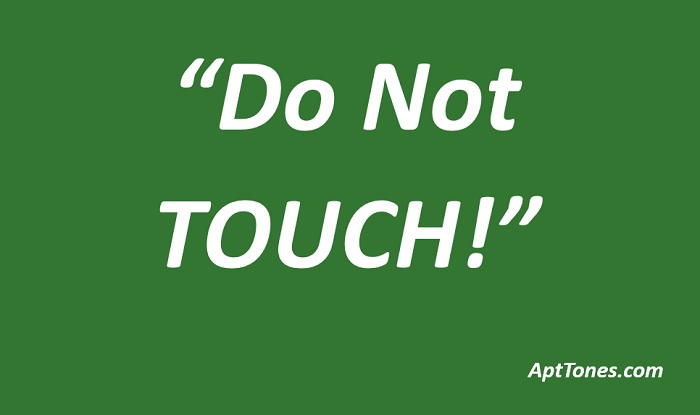Sometimes you need to tell someone not to touch something. The reasons vary – maybe it’s fragile, personal, or unhygienic.
Saying “don’t touch” can sound harsh or rude. There are better ways to get your message across.
Here are 25 polite alternatives that keep things friendly while protecting what matters to you.
25 Polite Ways to Say “Do Not Touch”

1. “Please, Keep a Safe Distance From This Item.”
This phrase is a tactful way to request that someone not touch an object, using the reasoning of maintaining a “safe distance.”
Example: “Please, keep a safe distance from this sculpture, it’s quite fragile.”
2. “Could We Please Admire This from Afar?”
This is a gentle way of asking someone to refrain from touching, by suggesting they admire the object from a distance.
Example: “Could we please admire this painting from afar? The oils can be damaged by touch.”
3. “Would You Mind Not Handling This?”
This polite question makes it clear that you’re asking someone not to touch something, without sounding commanding or harsh.
Example: “Would you mind not handling this? It’s a delicate artifact.”
4. “Let’s Keep Our Hands Off, Shall We?”
This friendly request includes yourself in the action, which softens the message and makes it sound like a mutual agreement.
Example: “Let’s keep our hands off the exhibit, shall we?”
5. “I’d Appreciate If We Don’t Touch This.”
This phrase makes it a personal request, expressing your appreciation if the other party refrains from touching.
Example: “I’d appreciate if we don’t touch this, it’s a personal belonging.”
6. “This Is Not for Touching, I’m Afraid.”
This polite phrase uses a softener (“I’m afraid”) to make the prohibition sound less blunt.
Example: “This instrument is not for touching, I’m afraid. It’s very delicate.”
7. “This Is Hands-Off, Please.”
This phrase is direct but still polite, as the “please” softens the request.
Example: “This is hands-off, please. It’s been freshly painted.”
8. “May I Request We Don’t Touch This?”
This is a very polite and formal way to ask someone not to touch something.
Example: “May I request we don’t touch this? It’s a priceless antique.”
9. “Could We Practice a Look-Don’t-Touch Policy Here?”
This phrase is a gentle way to suggest that the object should only be observed, not touched.
Example: “Could we practice a look-don’t-touch policy with these rare books?”
10. “This Is Off-Limits for Touching.”
This phrase is fairly direct, but still polite, indicating that the object is not to be touched.
Example: “This display is off-limits for touching, thank you.”
Respect for others’ belongings is fundamental to harmonious interaction.
11. “Would You Mind Keeping Your Hands to Yourself?”
This phrase is a polite way to ask someone to refrain from touching something.
Example: “Would you mind keeping your hands to yourself? This is a very delicate piece.”
12. “Let’s Be Observers, Not Touchers.”
This phrase communicates the importance of not touching by suggesting a role (observer) that the person can adopt.
Example: “Let’s be observers, not touchers, in this gallery.”
13. “Please Refrain from Touching, Thank You.”
This phrase is polite, formal, and clearly communicates that touching is not allowed.
Example: “Please refrain from touching the glassware, thank you.”
14. “Could You Please Avoid Physical Contact with This?”
This phrase is a formal and polite way to request someone not to touch something.
Example: “Could you please avoid physical contact with this artwork?”
15. “Please Treat This as a Museum Piece.”
This phrase suggests that the item should be treated with the same respect and hands-off approach as a museum piece.
Example: “Please treat this model as a museum piece—it’s very fragile.”
16. “This Item Appreciates Your No-Touch Approach.”
This is a friendly and indirect way to ask someone not to touch something.
Example: “This item appreciates your no-touch approach, it’s sensitive to fingerprints.”
17. “Please Honor the No-Hands-On Rule Here.”
This phrase is an assertive but polite way to remind someone not to touch something.
Example: “Please honor the no-hands-on rule with this ancient artifact.”
18. “This Prefers Admiration from a Distance.”
This personified phrase is a polite and indirect way to suggest that something should not be touched.
Example: “This statue prefers admiration from a distance.”
19. “May I Suggest We Browse with Our Eyes Only?”
This phrase is a courteous way to ask someone to look without touching.
Example: “May I suggest we browse these handmade crafts with our eyes only?”
20. “Please Consider This a No-Touch Zone.”
This phrase clearly establishes a boundary without sounding overly harsh or stern.
Example: “Please consider this kitchen a no-touch zone while the food is being prepared.”
21. “Can We Agree to Look, Not Touch?”
By suggesting an agreement, this phrase makes the request to not touch feel more like a joint decision.
Example: “Can we agree to look, not touch, in this store?”
22. “Please Keep Hands Off, for Its Sake.”
This phrase makes the request sound considerate and for the benefit of the item itself.
Example: “Please keep hands off the piano, for its sake.”
23. “Let’s Maintain a Touch-Free Environment Here.”
This phrase politely suggests a general rule rather than targeting a specific individual, making it less personal and more about maintaining a certain environment.
Example: “Let’s maintain a touch-free environment in this workshop, shall we?”
24. “Would You Be So Kind as to Not Touch?”
This phrase is highly polite and formal, suitable for situations where a high degree of respect and courtesy is required.
Example: “Would you be so kind as to not touch the glass display?”
25. “Please Resist the Urge to Touch.”
This phrase acknowledges that the desire to touch might be present, but politely asks the person to resist it.
Example: “Please resist the urge to touch these delicate fabrics.”
Mastering the art of polite requests can ease social interactions and help maintain boundaries without causing offense. These phrases should assist in articulating your needs while remaining courteous and respectful.